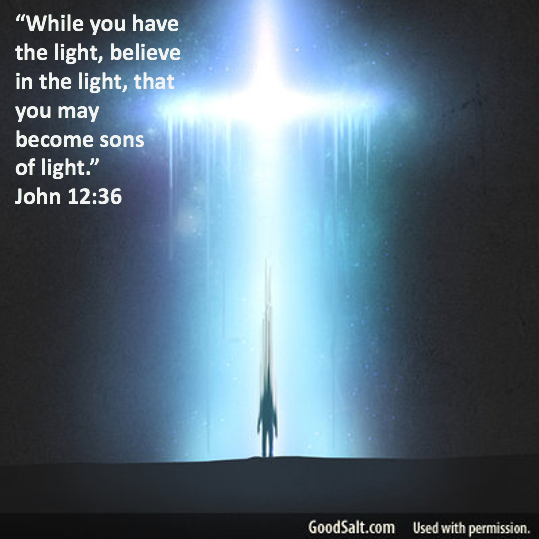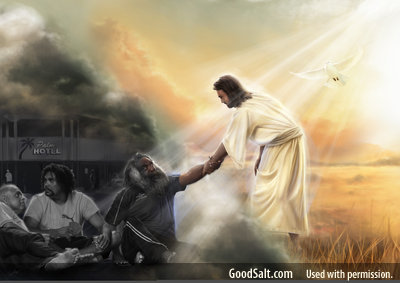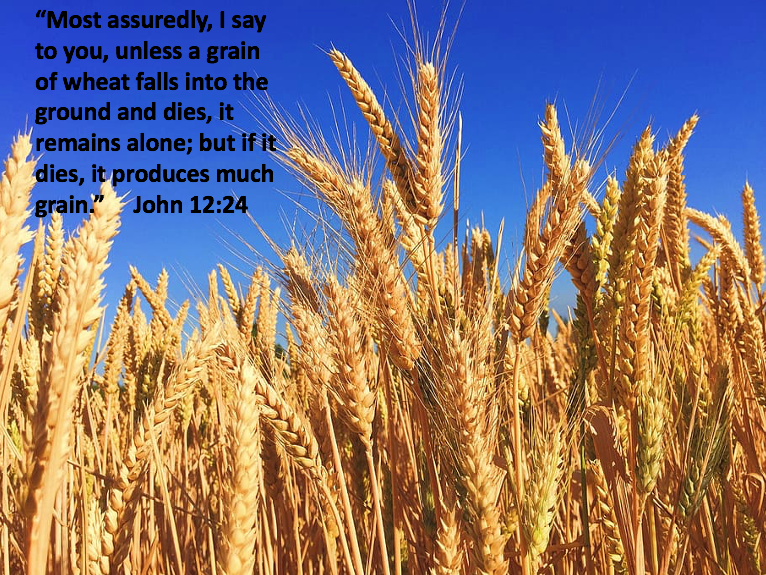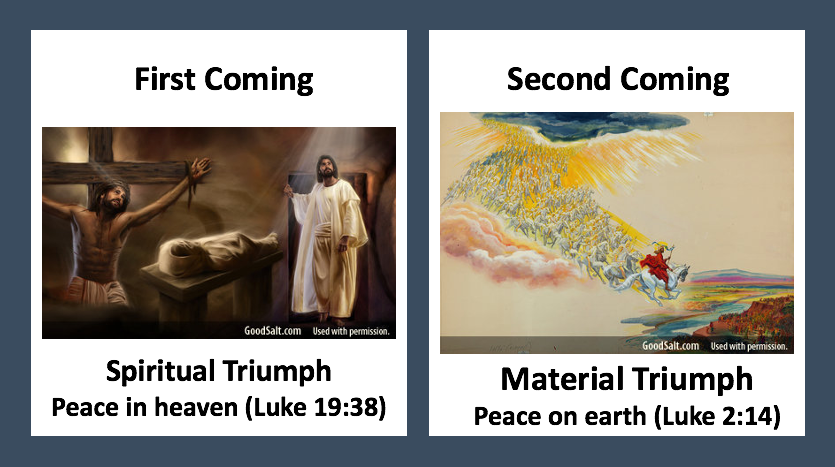“ ‘While you have the light, believe in the light, that you may become sons of light.’ ” These things Jesus spoke, and departed, and was hidden from them.” John 12:36
In our study of the gospel of John we have come to Jesus’ final words to the public before His death on the Cross. The people to whom He spoke had important decisions to make before Christ left them. In John 12:23, 32-33, Christ said that the “Son of Man” was to be lifted up on the Cross rather than be lifted up as a Ruler over the nations. This confused many of the people of Israel. We are looking at how Jesus responds to them to learn how we can respond to those who refuse to believe in Christ. Last time we learned to challenge them to seek God while there is still time (John 12:34-35). The second way we can respond to them is to COUNSEL THEM TO BELIEVE IN CHRIST ALONE WHILE THERE IS TIME (John 12:36).
Jesus said to the crowd, “While you have the light, believe in the light, that you may become sons of light.” (John 12:36a). These people needed to “believe in the light,”Jesus Christ, as soon as possible (“while you have the light”), before the Cross. After the Cross, when the Light was no longer with them, it would be more difficult for them to believe. No person is promised tomorrow on earth, so it is important for them to respond in faith to Christ while they still have time.
Notice that Christ says they can become “sons of light” simply by believing or trusting in Him alone for His gift of salvation. This verse does not say they become “sons of light” by going to church, being baptized, confessing their sins, keeping the commandments, or praying. The only condition is to believe in the light which is Jesus Christ.
How often today do you hear a Christian use the word “believe” when inviting a non-Christian to respond to the gospel of Jesus Christ? It rarely happens. Search the internet and see how many Christian churches and organizations use the word “believe” or its synonym “trust” in their plan of salvation as the sole condition for obtaining eternal life from Jesus Christ. It is very seldom. Instead they use unclear clichés and phrases such as “accept Jesus, give your life or heart to Jesus, ask Jesus into your heart, repent or turn from your sins, confess Jesus as Lord, or submit to Jesus as your Lord.” Lost people are being told to do everything but believe in the Lord Jesus for eternal life. I am convinced that the greatest need in evangelism today is for Christian workers to return to using the words that God uses most in evangelism – the words believe and faith.
Some people confuse the use of the word “believe” in the Bible with common uses of the English word “believe.” For example, we may hear people say these common phrases in English:
– “I believe it is going to snow today.”
– “I believe I voted for the wrong candidate.”
– “I don’t believe voting makes any difference.”
– “I believe I gave her the wrong directions.”
So when people hear us use the word “believe” in relation to Jesus Christ, they may think it only conveys speculation. But the use of the word “believe” in the Bible communicates absolute certainty. When Christ says, “believe in the light” (John 12:36a), He is inviting people to be convinced that He is God Who is “the light,” and then to trust in Him alone. John writes in his epistle, “This is the message which we have heard from Him and declare to you, that God is light and in Him is no darkness at all.” (cf. I John 1:5). There was no darkness or sin in Jesus Christ because He is God (I John 5:20; cf. Hebrews 1:8; 4:15). Therefore, only Jesus could give them life that never ends. Jesus does not direct unbelievers to the Father to receive everlasting life. He directs them to Himself for this gift (John 5:21, 40; 6:40, 47). Christ proclaimed, “I am the way, the truth, and the life. No one comes to the Father except through Me.” (John 14:6).
Sometimes I will encounter non-Christians who think they must do something in addition to believing or trusting in Christ alone to give them everlasting life. For example, when I ask a person, “What does God say you must do to get to heaven?” He or she responds, “I must believe in Christ and … be baptized or live a godly life or love others or take communion or confess all my sins.” And the list goes on and on and on. But is that what Jesus says?
Christ said to a religious leader named Nicodemus, “14 And as Moses lifted up the serpent in the wilderness, even so must the Son of Man be lifted up, 15 that whoever BELIEVES in Him should not perish but have eternal life. 16 For God so loved the world that He gave His only begotten Son, that whoever BELIEVES in Him should not perish but have everlasting life. 17 For God did not send His Son into the world to condemn the world, but that the world through Him might be saved. 18 He who BELIEVES in Him is not condemned; but he who does not BELIEVE is condemned already, because he has not BELIEVED in the name of the only begotten Son of God.” (John 3:14-18).
According to John 3:14-16, who has everlasting life? The one who “believes in… the Son of Man,” Jesus Christ, Who was “lifted up” on a Cross (cf. John 8:28; 12:23, 32-33). According to John 3:17, Who is the one Person by which one must be saved? “Through Him,” God’s only begotten “Son,” Jesus Christ. According to John 3:18, what is the basis upon which a person is condemned or not condemned? Belief or unbelief in God’s “only begotten Son,” Jesus Christ.
It does not matter what your religion or denomination or pastor or priest teaches. What matters is what Jesus Christ taught. Repeatedly Jesus teaches that believing in Him alone is the only condition for everlasting life (cf. John 3:14-18; 5:46; 6:29, 35-36, 40, 47; 7;38; 8:24, 45; 9:35; 10:37-38; 11:25-26; 12:36, 46; 13:19; 14:1, 11-12; 16:9; 17:20; et al.).
When Jesus was hanging on the Cross, He said, “It is finished!” (John 19:30). The Greek word translated “finished” is tetelestai. It means “paid in full.” Receipts in New Testament times were stamped with this word which meant that the debt had been paid in full. Christ did not make a down payment for our sin when He died on the Cross so that we must pay the remainder of our sin debt to God. God does not accept us on the basis of our good life, our keeping of His commandments, our water baptism, or the sacraments we have taken. We are accepted by God on the basis of the full payment for our sin debt to God when Jesus Christ died and rose again on our behalf. God was completely and forever satisfied with Jesus’ full payment for our sin. The verb tetelestai is in the perfect tense. This means Christ made the full payment for our sin debt when He died on the cross and it remains paid in full to the present.
When we communicate the gospel with non-Christians, we must be clear that all people have sinned against God and deserve to die forever in the Lake of Fire (Romans 3:23; 6:23; Revelation 20:15). No amount of our good thoughts, words, or actions can change the fact that we are sinners before a holy God (Isaiah 64:6). Because Jesus finished paying the penalty for our sins when He died in our place, that means we do not have to work for our salvation (Romans 4:5; Ephesians 2:8-9). All God asks of us is to believe in Jesus alone and His finished work on the Cross as sufficient payment for our sins (John 3:14-15; 19:30). When we do, He gives us everlasting life and forgives all our sins (John 3:16; Acts 10:43).
Those who are trusting in their good works or in Christ plus their good works to get them to heaven, are telling God the Father that Jesus’ death on the cross failed to pay their sin debt in full. However, since God was forever satisfied with His perfect Son’s payment for the sin of the world (Isaiah 53:11; John 19:30; I John 2:2), we must also be satisfied with what satisfies God. God cannot accept anything we do as payment for our sins because He has already accepted His Son’s complete payment for all of our sins when He died in our place on the Cross.
Those who “believe in the light [i.e., in Jesus]… become sons of light” (John 12:36; cf. Ephesian 5:8). Every believer in Jesus is defined by the “light” of Jesus Christ instead of by their sin or shame. Christ, Who is Light, lives inside us now (John 8:12). Our sinful hearts have been made new and are good and noble (Luke 8:15). God says, “I will give you a new heart and put a new spirit within you; I will take the heart of stone out of your flesh and give you a heart of flesh. I will put My Spirit within you and cause you to walk in My statues, and you will keep My judgments and do them.” (Ezekiel 36:26-27).
We have been given a new identity and a new nature defined by Christ’s light. A passion resides deep inside us that can be stronger than our passion for sin when we yield to the Holy Spirit inside us (Rom. 7:21-25; 8:1-7). It is a passion to love God and walk in His ways, just as Christ did. Because we are defined by the light of Christ, it is important to pay attention to the God-given passion He has given us to live for Him.
When Christ finished speaking He “departed, and was hidden from them” (John 12:36b) supernaturally. He seems to have vanished, reminding us that He is in control. His death will take place in God’s time. This departure of Jesus was an example of what He had just predicted (John 12:35) and should have motivated them to believe in Him while there was still time.
Prayer: Lord Jesus, please give me Your clarity and wisdom when communicating Your gospel message to non-Christians. So many people today are confused about what they must do to get to heaven.They are being told to do many different things in addition to believing or trusting in You alone for Your free gift of everlasting life. Satan is such a deceiver. He is not against any religion that leaves out a Christ-alone salvation because he knows it will lead them into an eternal hell. By Your grace, please bring all Christians back to Your basic promise that “whoever believes in Him [Jesus] should not perish but have everlasting life.” The more clearly we communicate Your gospel message, the more people can understand and believe in You alone for Your free gift while there is still time. Thank You, my Lord and my God, for making this message so clear and simple. In Your matchless name I pray. Amen.










